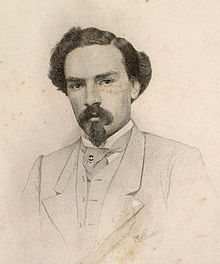Tomás Ribeiro
Tomás Antonio Ribeiro Ferreira (born July 1, 1831 in Parada de Gonta , Beira Alta , † February 6, 1901 in Lisbon ) was a Portuguese poet , journalist and politician .
Life
Tomás Ribeiro was born into a working class household. Nevertheless, he managed to graduate from high school and study law in Coimbra .
A unique political career followed in Portugal : in 1862 he became mayor of the municipality of Tondela , was prefect or district president of the districts of Porto and Bragança , general secretary of the Instituto Vasco da Gama in Goa , and also a member of the colonial government there . Under Prime Minister António Maria de Fontes Pereira de Melo , he was Minister of the Navy from 1878 to 1879 , Minister of Justice in 1879 , Minister for the Affairs of the King in 1881, and then Minister of Construction and Architecture. As Minister of Justice, he liberalized the laws. One of the laws caused a sensation for the then conservative Portugal: it allowed Catholics to marry non-Catholics and unbaptized people . From 1862 he was also a member and later Vice President of the Academy of Sciences in Lisbon.
He was married. He died on February 6, 1901.
The romantic
Together with António Feliciano de Castilho, Ribeiro was an important interpreter of romanticism in Portugal. Together with this he was a member of a literary circle in Coimbra . He was also friends with Camilo Castelo Branco . He wrote as a journalist for Gazeta de Portugal , Gazeta Comercial , Artes e Letras , Brasil-Portugal and founded his own magazines such as the Republica , O Improvicial , A Opiniao . He wrote an important travel diary about his stay in India . Many of his poems appeared in the romantic magazine " Novo Trovado ".
plant
- A delfina do mal (1868), poetry.
- Sons que passam, (1868), poetry.
- Jornadas (1873–1874), travel diaries about India.
- A Indiana, (Versepos), 1873.
swell
| personal data | |
|---|---|
| SURNAME | Ribeiro, Tomás |
| ALTERNATIVE NAMES | Ribeiro Ferreira, Tomás Antonio (full name) |
| BRIEF DESCRIPTION | Portuguese poet, journalist and politician |
| DATE OF BIRTH | July 1, 1831 |
| PLACE OF BIRTH | Parada da Gonta , Beira Alta |
| DATE OF DEATH | February 6, 1901 |
| Place of death | Lisbon |
